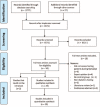Strategies to Make Ramadan Fasting Safer in Type 2 Diabetics: A Systematic Review and Network Meta-analysis of Randomized Controlled Trials and Observational Studies
- PMID: 26765440
- PMCID: PMC4718266
- DOI: 10.1097/MD.0000000000002457
Strategies to Make Ramadan Fasting Safer in Type 2 Diabetics: A Systematic Review and Network Meta-analysis of Randomized Controlled Trials and Observational Studies
Abstract
Ramadan is the holy month for Muslims whereby they fast from predawn to after sunset and is observed by all healthy Muslim adults as well as a large population of type 2 diabetic Muslims.To determine the comparative effectiveness of various strategies that have been used for type 2 diabetic Muslim who fast during Ramadan.A systematic review and network meta-analysis of randomized controlled studies (RCT) as well as observational studies for patients with type 2 diabetes who fasted during Ramadan was conducted. Eight databases were searched from January 1980 through October 2015 for relevant studies. Two reviewers independently screened and assessed study for eligibility, assessed the risk of bias, and extracted relevant data. A network meta-analysis for each outcome was fitted separately, combining direct and indirect evidence for each comparison.Twenty-nine studies, 16 RCTs and 13 observational studies each met the inclusion criteria. The most common strategy used was drug changes during the Ramadan period, which found that the use of DPP-4 (Dipeptidyl peptidase inhibitor -4) inhibitors were associated with a reduction in incidence of experiencing hypoglycemia during Ramadan in both RCTs (pooled relative risk: 0.56; 95% confidence interval: 0.44-0.72) as well as in observational studies (pooled relative risk: 0.27; 0.09-0.75). Ramadan-focused education was shown to be beneficial in reducing hypoglycemia in observational studies but not RCTs (0.25 versus 1.00). Network meta-analyses suggest that incretin mimetics can reduce the risk of hypoglycemia by nearly 1.5 times.The newer antidiabetic agents appear to lower the risk of hypoglycemia and improved glycemic control when compared with sulfonylureas. Ramadan-focused education shows to be a promising strategy but more rigorous examination from RCTs are required.
Conflict of interest statement
Competing Interests: All authors have completed the ICMJE uniform disclosure form at www.icmje.org/coi_disclosure.pdf (available on request from corresponding author).
The authors have no conflicts of interest to disclose.
Figures
Similar articles
-
Interventions for people with type 2 diabetes mellitus fasting during Ramadan.Cochrane Database Syst Rev. 2023 Jul 12;7(7):CD013178. doi: 10.1002/14651858.CD013178.pub2. Cochrane Database Syst Rev. 2023. PMID: 37435938 Free PMC article.
-
Safety and effectiveness of non-insulin glucose-lowering agents in the treatment of people with type 2 diabetes who observe Ramadan: a systematic review and meta-analysis.Diabetes Obes Metab. 2015 Jul;17(7):639-48. doi: 10.1111/dom.12462. Epub 2015 Apr 12. Diabetes Obes Metab. 2015. PMID: 25777247
-
Drugs for preventing postoperative nausea and vomiting in adults after general anaesthesia: a network meta-analysis.Cochrane Database Syst Rev. 2020 Oct 19;10(10):CD012859. doi: 10.1002/14651858.CD012859.pub2. Cochrane Database Syst Rev. 2020. PMID: 33075160 Free PMC article.
-
Systemic pharmacological treatments for chronic plaque psoriasis: a network meta-analysis.Cochrane Database Syst Rev. 2021 Apr 19;4(4):CD011535. doi: 10.1002/14651858.CD011535.pub4. Cochrane Database Syst Rev. 2021. Update in: Cochrane Database Syst Rev. 2022 May 23;5:CD011535. doi: 10.1002/14651858.CD011535.pub5. PMID: 33871055 Free PMC article. Updated.
-
Systemic pharmacological treatments for chronic plaque psoriasis: a network meta-analysis.Cochrane Database Syst Rev. 2017 Dec 22;12(12):CD011535. doi: 10.1002/14651858.CD011535.pub2. Cochrane Database Syst Rev. 2017. Update in: Cochrane Database Syst Rev. 2020 Jan 9;1:CD011535. doi: 10.1002/14651858.CD011535.pub3. PMID: 29271481 Free PMC article. Updated.
Cited by
-
Using telemedicine to support care for people with type 2 diabetes mellitus: a qualitative analysis of patients' perspectives.BMJ Open. 2019 Oct 22;9(10):e026575. doi: 10.1136/bmjopen-2018-026575. BMJ Open. 2019. PMID: 31640990 Free PMC article.
-
Type 2 diabetes patient's perspective on Ramadan fasting: a qualitative study.BMJ Open Diabetes Res Care. 2017 May 8;5(1):e000365. doi: 10.1136/bmjdrc-2016-000365. eCollection 2017. BMJ Open Diabetes Res Care. 2017. PMID: 28761651 Free PMC article.
-
Comparative effectiveness of telemedicine strategies on type 2 diabetes management: A systematic review and network meta-analysis.Sci Rep. 2017 Oct 4;7(1):12680. doi: 10.1038/s41598-017-12987-z. Sci Rep. 2017. PMID: 28978949 Free PMC article.
-
Effect of Ramadan fasting on glycaemic parameters & body mass index in type II diabetic patients: A meta-analysis.Indian J Med Res. 2019 Dec;150(6):546-556. doi: 10.4103/ijmr.IJMR_1380_17. Indian J Med Res. 2019. PMID: 32048618 Free PMC article.
-
Association of diabetes-related self-care activities with glycemic control of patients with type 2 diabetes in Pakistan.Patient Prefer Adherence. 2018 Nov 9;12:2377-2385. doi: 10.2147/PPA.S177314. eCollection 2018. Patient Prefer Adherence. 2018. PMID: 30519003 Free PMC article.
References
-
- The Global Religious Landscape: A Report on the Size and Distribution of the World's Major Religious Groups as of 2010. Washington, DC: Pew Research Center; 2012.
-
- Salti I, Benard E, Detournay B, et al. A population-based study of diabetes and its characteristics during the fasting month of Ramadan in 13 countries: results of the epidemiology of diabetes and Ramadan 1422/2001 (EPIDIAR) study. Diabetes Care 2004; 27:2306–2311. - PubMed
-
- Abrams KR, Gillies CL, Lambert PC. Meta-analysis of heterogeneously reported trials assessing change from baseline. Stat Med 2005; 24:3823–3844. - PubMed
Publication types
MeSH terms
Substances
LinkOut - more resources
Full Text Sources
Other Literature Sources
Medical
Miscellaneous



